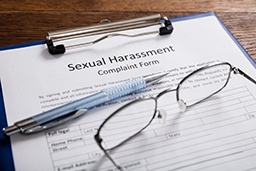Summer Associate Adam Korn contributed to this post
In the wake of the #MeToo Movement, New York has become the most recent state to make it easier for employees to bring sexual harassment lawsuits against their employers. On August 12, 2019, Governor Andrew Cuomo signed legislation into law that lowers the bar for what is considered workplace harassment and eliminates many of the barriers employees have faced in litigating these claims. Here’s how:
The “Severe or Pervasive” Requirement Has Been Eliminated
The exiting "severe or pervasive" standard typically applied to sexual harassment cases has been replaced with a much less rigorous benchmark. Now, sex-based harassment is unlawful if it "subjects an individual to inferior terms, conditions or privileges of employment” regardless of whether such conduct is considered severe or pervasive. This means that employers lose the “severe or pervasive” affirmative defense to liability, and moving forward, the law in New York requires only that an employee show that alleged harassment or retaliation rises above the level of “petty slights and trivial inconveniences.”
No More Faragher-Ellerth Defense
In addition, the law nixes the well-established Faragher-Ellerth defense. Named after a couple of Supreme Court cases, Faragher-Ellerth has allowed employers to challenge discrimination and harassment claims when employees failed to take advantage of their employers’ internal complaint policies and procedures. This is no longer the case in New York. Plaintiffs will be able to impute liability to an employer for a supervisor’s harassment, even if the employer had no prior knowledge or warning that such harassment had occurred.
Employees Need Not Point to Similarly Situated Comparators.
The law also does away with the federal requirement that employees must compare their treatment to that of similarly situated individuals belonging to different protected classes. Instead, employers in New York may be held liable for sexual harassment or discrimination even when aggrieved employees are unable to show that they were treated less favorably than other similarly situated parties.
Broadened Definition of Employer
No employer is too small to be liable for sexual misconduct under the New York law. In fact, all employers in the state, regardless of size, are now covered under the legislation, which has eliminated the carve-out for employers with fewer than four employees.
Likewise, the law extends employer liability to certain non-employees—contractors, vendors, and consultants—when employers knew or should have known such parties were subjected to unlawful discrimination in the workplace and failed to take immediate and appropriate corrective action.
Attorneys’ Fees and Punitive Damages Are Now Recoverable
For the first time in New York, punitive damages and attorneys’ fees will be available as a remedy in all cases of employment discrimination related to private employers. As for the latter, the recovery of attorneys’ fees by the prevailing party appears to be mandatory. Of note, the law makes it more difficult for employers to recover attorneys’ fees by requiring them to demonstrate that actions brought by plaintiffs were frivolous or alleged in bad faith (employees have no equivalent requirement).
Arbitration Agreements Are Prohibited
The law takes a significant swipe at mandatory arbitration. Going forward, mandatory arbitration agreements, signed before any given dispute occurs, will be excluded—not just for harassment, but any type of discrimination claim.
No More Nondisclosure Agreements
Similarly, the law prohibits nondisclosure agreements in settlement agreements in connection with all discrimination cases—this in addition to NDAs regarding potential future discrimination claims. This is yet another way the law facilitates employees having their stories heard in court.
The Takeaway
It’s important to understand that the New York law doesn’t impact federal law—Title VII remains unchanged. Still, the law in New York will likely increase the number of harassment, retaliation, and discrimination claims brought in state court.
That being said, New York employers should review their workplace discrimination policies, procedures, and training to make sure that they’re all up-to-date. Anti-harassment policies must be comprehensive and fully describe how allegations of sexual misconduct in the workplace are to be handled and to whom they should be reported.
There’s no time to dawdle. The law required employers to provide sexual harassment prevention training by October 9, 2019. As that date has passed, employers should not hesitate to seek legal counsel for help with appropriate workplace policies, mandated training, and litigation strategies in light of the signed legislation. Of course, the employment attorneys at Michelman & Robinson, LLP are here to assist.
This blog post is not offered, and should not be relied on, as legal advice. You should consult an attorney for advice in specific situations.

